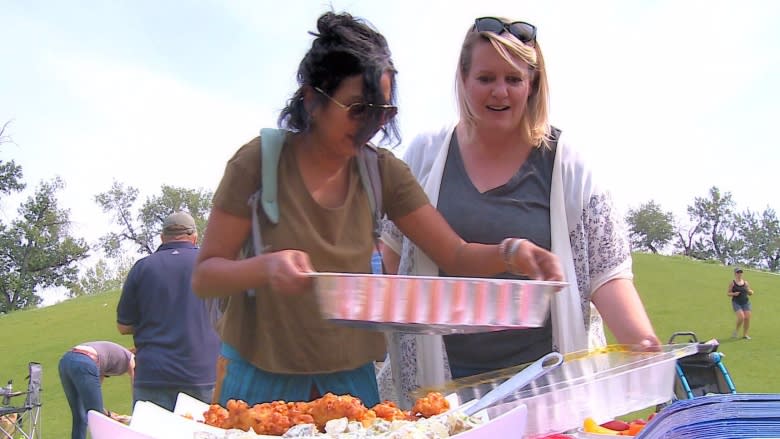Samosas, picnic blankets and chocolate chip cookies unite 500 Calgarians after Charlottesville violence
Roughly 500 Calgarians gathered at St. Patrick's Island to share a potluck picnic on the weekend in response to the recent violence in Charlottesville.
Project Potluck, organized by food blogger Julie Van Rosendaal, was an opportunity for people of all backgrounds to come together and discuss their similarities and difference over a meal.
Seated on picnic blankets and lawn chairs, participants dug into dishes ranging from samosas to white bread sandwiches, fragrant curries, potato salad and chocolate chip cookies.
"The best way to get to know our broader community, and the issues that they face, and their worries and what they're dealing with, is to talk with them. And the best way to bring people together is around food," Van Rosendaal said.
Besides food and cutlery, others brought colourful signs that read "No hate, just noms," and "Our table's without borders."
Sharing, not separating
Van Rosendaal chose the idea of a potluck because she wanted everyone to contribute something of their own. She believes food is deeply personal and sharing it provides an opportunity to learn about different cultures.
Seated atop a colourful picnic blanket with her sister and nephew, Judy Clare munched on fresh fruit, homemade baked goods and hummus.
"I wouldn't have eaten hummus when I was growing up, but now I make it every week, and it's delicious. It's not from where I'm from," she said Sunday.
Clare, who said she's not much of an activist, said this event was an opportunity for her to make a statement, but in a way that brings people together.
"I don't go out and march and stuff like that, but I appreciate the opportunity to share with people," she said.
"I feel like protests and activism are just so angry, and you're separating people even more. Something like this is more about sharing and bringing people together rather than separating."
Van Rosendaal said it was "such a great feeling" to see hundreds of people turn out to the event.
"It's talking, meeting people face to face, hearing their perspectives and discussing what needs to be done — what we can do to help people feel less marginalized, less scared, less alone," Van Rosendaal said.
"We might not agree, but that's OK, because we still need to have those discussions."
Encouraged by the large turnout at her first event, Van Rosendaal suggested the community gathering could become an annual or even a monthly event.



